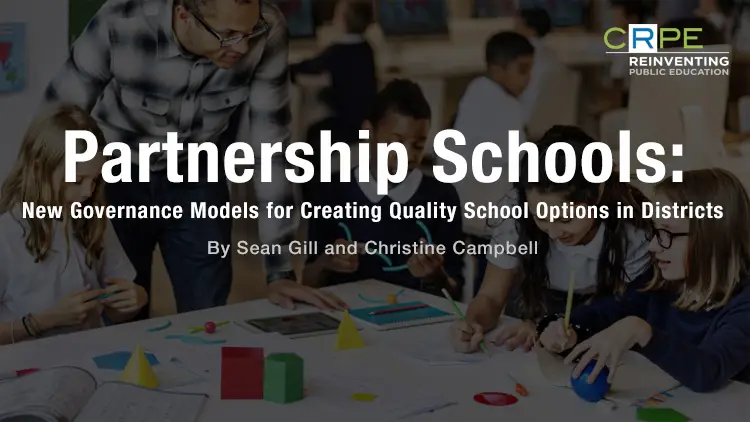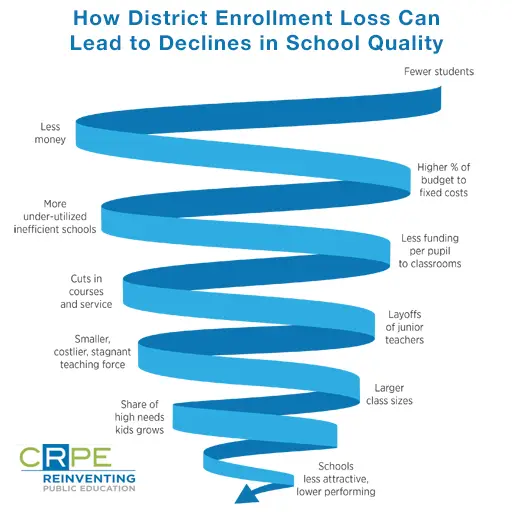District Schools? Charters? In Indianapolis, Partnership Schools Offer A Third Way

In 1997, Paul Hill published his book Reinventing Public Education: How Contracting Can Transform America’s Schools (the center where I work at the University of Washington was founded on the ideas presented). With his co-authors, Lawrence Pierce and James Guthrie, Hill proposed that all schools in a city should be contracted out to school-based nonprofits […]
Four Reasons School Districts Can Be Financially Impaired by Charter School Growth
Our report, Better Together: Ensuring Quality District Schools in Times of Charter Growth and Declining Enrollment, takes an honest look at an urgent problem that has long divided education leaders. To help inform and advance a thoughtful discussion, we invited a number of experts to share their views on this complex and politically charged issue. […]
Don’t Limit High-Quality Public School Options For Students
Our report, Better Together: Ensuring Quality District Schools in Times of Charter Growth and Declining Enrollment, takes an honest look at an urgent problem that has long divided education leaders. To help inform and advance a thoughtful discussion, we invited a number of experts to share their views on this complex and politically charged issue. […]
District Schools Don’t Always Have to Close—They Can Transform
Our report, Better Together: Ensuring Quality District Schools in Times of Charter Growth and Declining Enrollment, takes an honest look at an urgent problem that has long divided education leaders. To help inform and advance a thoughtful discussion, we invited a number of experts to share their views on this complex and politically charged issue. […]
Reviews of “Better Together: Ensuring Quality District Schools in Times of Charter Growth and Declining Enrollment”
/* ><!*/ Our report, Better Together: Ensuring Quality District Schools in Times of Charter Growth and Declining Enrollment, is intended to spur constructive dialogue and action on a complex issue that has long divided education leaders. Here’s what experts from across the district and charter spectrum are saying about CRPE’s approach and possible solutions to […]
The Forces Behind Declining Enrollment and a New Way Forward
Our report, Better Together: Ensuring Quality District Schools in Times of Charter Growth and Declining Enrollment, takes an honest look at an urgent problem that has long divided education leaders. To help inform and advance a thoughtful discussion, we invited a number of experts to share their views on this complex and politically charged issue. […]
Experts Respond to Better Together: How Can Districts and Charters Tackle Declining Enrollment?
When districts go into a major period of declining enrollment, schools can experience chaotic changes in staffing, course offerings, and student supports—as fixed costs eat up an increasingly large share of revenues, and teacher and student morale spirals downward. The harm this causes students should be unacceptable to everyone. Yet this situation is occurring in […]
The charter movement’s “tipping point” strategy isn’t working. What now?

For those in the charter movement who have viewed chartering as a systemic reform strategy (not just an escape hatch for some kids), the prevalent theory of action for the last ten to fifteen years has been a “tipping point” strategy. The idea was to concentrate growth in targeted cities until districts either responded to […]
Returning the Favor: David Osborne Goes Deep in “Reinventing America’s Schools”
22 years ago, I published a RAND report, Reinventing Public Education, urging that all public schools operate under contracts with public officials. (This later grew into a book with the same title written with Larry Pierce and Jim Guthrie.) The core argument came from my earlier studies on school effectiveness—that every public school needed a […]
How Politics Can Enhance the Work of School Reform
I live in Seattle, a deeply “blue,” progressive city. There are a lot of great things about being surrounded by people passionate about public policy and willing to exert their political muscles to fight for the things they care about, whether that may be protesting the Trump administration’s immigration policy or fighting for a higher […]


